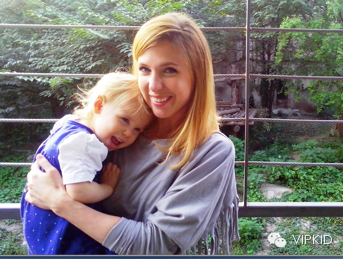孩子不自信 谈谈孩子自尊心(图)
- 活动报名:移动互联时代教育机构如何再创业
- 高峰论坛:奔跑吧,在线教育!
- 有奖调查:参与教育APP使用调查赢iPhone6 plus
- 有奖评测:寻找最好教育APP(中小学 外语 考试)
- 奖项投票:2014中国教育盛典各大奖项投票中
 上图是VIPKID Curriculum Manager Lane 和小女儿Stella~
上图是VIPKID Curriculum Manager Lane 和小女儿Stella~Question: My child is very shy. He is afraid of people, not mention public speaking. What should I do to help build his self-confidence andself esteem?
问题:我家小孩实在太害羞了!他特别害怕人多的地方,更别说当众发言了。我能做什么帮助他呢?
"Self-esteem comes from having a sense of belonging, believing that we're capable, and knowing our contributions are valued and worthwhile," says California family therapist Jane Nelsen,co-author of the Positive Discipline series。
来自加利福尼亚的家庭治疗师Jane Nelsen(《正面管教》作者之一)说过:“自尊自信来自一个人内心的归属感,相信自己能行,知道我们对这个世界的贡献是有价值的。”
"As any parent knows, self-esteem is a fleeting experience," says Nelsen. "Sometimes we feel good about ourselves and sometimes we don't. What we're really trying to teach our kids are life skills like resiliency."
“所有家长[微博]都知道,自尊是一种稍纵即逝的体验,”尼尔森说,“我们对自己的感觉时好时坏。我们真正需要教给我们下一代的是应对生活的技巧,比如说灵活掌握生活的节奏。”
Your goal as a parent is to ensure that your child develops pride and self-respect — in himself and in his cultural roots — as well as faith in his ability to handle life's challenges. Here are several simple strategies to help boost your child's self-esteem:
为人父母的目标是确保你的孩子建立自豪自重的品质-无论是在自我认识,自身文化归属还是对生活的信念-相信自己能够应对生活的挑战。
以下有几个小建议:
Give unconditionallove。
A child's self-esteem flourishes with the kind of no-strings-attached devotion that says,"I love you, no matter who you are or what you do." Your child benefits the most when you accept him for who he is regardless of his strengths, difficulties, temperament, or abilities。
When you do have to correct your child,make it clear that it's his behavior — not him — that's unacceptable。
给孩子无条件的爱
孩子的自尊会在一种无条件的奉献中得到升华,还有句话叫:“我爱你,不管你是谁你做什么工作。”孩子会因为你对他全然的接受和爱护受益匪浅-无论他的优缺点、遇到的困难、气质或者能力。当需要帮助孩子改正错误的时候,请一定要明确:我们帮助孩子改正的是他的行为,而不是他本身。
Pay attention。
Carve out time to give your preschooler your undivided attention. That does wonders for your child's self-worth because it sends the message that you think he's important and valuable。
静下来关注
尤其是在小孩学龄前挤出时间陪小孩并给予百分之百的关注。这对孩子来说很重要,因为他会觉得你认为他很重要。
Teach limits。
Establish a few reasonable rules. For instance, if you tell your child he has to eat his snack in the kitchen, don't let him wander around the family room with his crackers and fruit the next day.Knowing that certain family rules are set in stone will help him feel more secure。
规矩设定
建立一些合理的规矩。比如,如果你跟你的孩子说只能在厨房里吃零食,那么就坚持到底吧,别转天就让她抱着薯片在客厅走来走去。让孩子知道家规就是家规会让孩子意志更加坚定。
Let mistakes happen。
If your child puts his plate too close to the edge of the table and it falls, encourage him to think about what he might do differently next time. That way his self-esteem won't sag and he'll understand that it's okay to make mistakes sometimes。
给孩子犯错的机会
如果孩子把碗放在桌子边上碗掉下去摔碎了,鼓励他去思考下一次应该怎么做。通过这样的方式他的自尊会得到很好的发展也会明白人有时会犯错误,没什么大不了。
Listen well。
If your child is trying to tell you something, stop and listen to what he has to say, even if you don't understand all his words. He needs to know that his thoughts and feelings matter。
更好地倾听
如果小孩子想跟你分享什么事情,停下你手中的事情认真倾听把,哪怕你根本不太能理解他在讲什么。让你的孩子知道他的分享是很重要的。
Offer empathy。
If your child gets frustrated because he can't do things his peers can ("I can't catch a ball like Sophia!"), show him empathy and then emphasize one of his strengths. For instance, say, "Sophia is good at catching a ball. And you're good at painting pictures." This can help your child learn that we all have strengths and weaknesses, and that he doesn't have to be perfect to feel good about himself。
表示同情理解
如果你的孩子因为不能做到其他小孩能轻易做到的事情而分外沮丧(比如小孩说:“我不能像索菲亚那样轻易抓到球。”),这是我们应该表示同情理解并放大他的优势。比如你可以告诉他:“索菲亚很善于抓球,而你很善于画画哦!”这样小孩子可以更清楚地明白尺有所短,寸有所长的道理,而且人无完人,不必为自己的不足感到沮丧。
Provide encouragement。
Every child needs the kind of support from loved ones that signals, "I believe in you. I seeyour effort. Keep going!" Encouragement means acknowledging progress — not just rewarding achievement。
多多鼓励
每个孩子都需要来自爱他们的人的鼓励,比如你可以说:“宝贝,我相信你,我看到你的努力了,继续加油!”鼓励意味肯定孩子的进步,而不是仅仅奖励某个具体的成就。
Lane的简介
Lane is an education professional with eight years of experience teaching and designing curriculum. Lane was born in a small city in America and as a child dreamed of traveling the world. After graduating from university and living in Mexico and Spain, Lane moved to Guangzhou, China. She met her husband(a New Zealander) in Guangzhou and, in 2012, their daughter Stella was born. Lane’s passion for education continues to motivate her to create educational materials that benefit children both cognitively and socially. Lane aspires to make language learning an experience which captures and cultivates children’s natural passion and curiosity。
宜兰是一个拥有八年的教学课程设计经验的学术专家。她出生在美国一个小城市,在小时候就梦想着环游世界。大学毕业后,住在墨西哥和西班牙,后来她搬到了中国的广东。在广州,她遇到了她的丈夫(一个新西兰人), 2012年,他们的女儿呱呱坠地。宜兰对教育的热情激励着她对教材编写的热情, 为儿童和社会做出贡献。宜兰希望语言学习能成为一种培养儿童自然激情和好奇心的体验。
文:Lane
翻译:代晓筠
文章关键词: 自尊心
- 华人砸金教子 美教授称伤娃自尊和自由2014-10-11 15:30
- 专家指导:如何让孩子快乐学习英语2014-11-09 14:58
- 专家教孩子改掉“口音”式英语(图)2014-11-08 13:41
- 华裔孩子穿开裆裤惊呆美国人2014-11-07 16:37
- 李开复:如何从小培养孩子创新力2014-11-07 10:59














新浪警示:任何收费预测彩票会员等广告皆为诈骗,请勿上当!点击进入详情